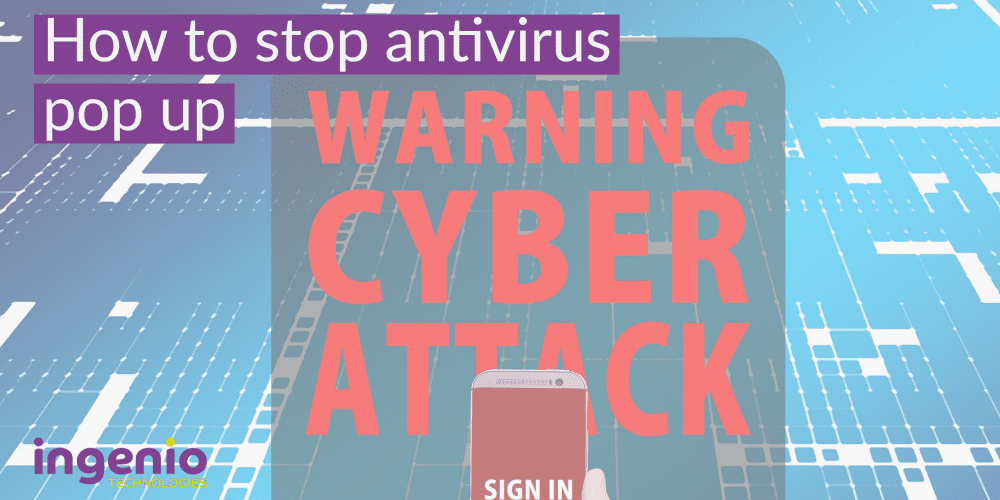Antivirus protection is vital to have for your device, it keeps your business data safe from any viruses or other software launched by cyber criminals.
Have you received an antivirus pop up notification? In this blog, we explain how to check whether it’s a scam, how to prevent the scam, and how to turn off pop up notifications.
An example of an antivirus is McAfee, you may have this on your device. You may have received a notification from them recently about your expired subscription. If you do use McAfee, then this may be a genuine notification which you will need to get your IT support team to look into. However, if you do not use McAfee then this may be a scam.
What is the fake McAfee antivirus pop up?
The fake antivirus pop up has been appearing to a lot of people around the world as a simple notification such as, ” Warning: Your protection from viruses has expired! Purchase a subscription to fight back against malware and other cyber threats”.
The scam is designed as an expired subscription notification, so it appears legitimate to the user. Imagine if this came up for you, you’d begin to worry that your device is no longer protected and open to hackers.
The notification gives the user two options; “Accept risk” or “Get protection”. The user is most likely to click “get protection” because they will want to make sure that their business is safe and secure – this is what the hackers are counting on. The link will redirect the user to a fake subscription renewal page that has been created by the scammers
What happens if you renew your subscription?
In order to renew your subscription, you will need to enter your payment card details. This means the scammer now has access to your card details and will abuse it.
You may think it seems a bit odd that you have to put in your card details so you may exit the page, the hackers won’t stop there and will try to exploit your business in other ways.
Other methods hackers will exploit our business
- The hackers may send out emails to employees within your business, encouraging them to renew the subscription.
- Act as if they empathise with you and want to help by offering you a guide to download, this guide will contain malicious software which will be unleashed to your business network.
- Offer an incentive – the cyber criminals may offer you a premium antivirus software, available if you “click the link”- this, again, will be full of malicious software.
How to spot the fake antivirus pop up notification
Spotting that the antivirus pop up is a scam is the first line of defence as this will allow you to take action before any damage is done. If the popup for the antivirus renewal is not one you are using, such as the McAfee example above, then it will be pretty obvious that it’s not real and is most probably a scam notification. However, the best way to spot a spam notification would be to examine the message closely; look for obvious signs of fraud such as poor spelling, unprofessional imagery, bad grammar and an email address that doesn’t look right or has a different domain name. All of these things can be an indication that you have received spam. If in doubt don’t click on anything in the message and get in contact with your IT company to double check.
How to prevent the antivirus pop up notification scam
If you’ve figured out that this antivirus pop up notification is a scam, then you should close the pop-up and browser without clicking on the notification. If you’re still receiving push notifications, then you’ll need to block these irritating notifications on your browser to prevent you from clicking on them.
Notifications may still appear even without your browser open, if this occurs then you’ll urgently need to scan the device for malware. Point to note, keeping your antivirus up to date will help limit these threats.
Antivirus, as a minimum, is the most basic level of cyber security and you can no longer rely on it to keep your business data completely safe. You should upgrade to Endpoint Detection and Response (EDR) for next-level protection. Discover more about this in a previous blog we wrote Antivirus is dead, your business needs an upgrade to keep it safe.
If you are concerned about the safety of your business and would like to speak to some cyber security experts, then get in touch on 01273 806211 or email hello@ingeniotech.co.uk


